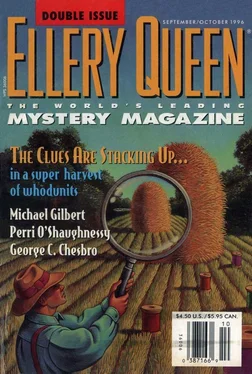Doug Allyn - v108 n03-04_1996-09-10
Здесь есть возможность читать онлайн «Doug Allyn - v108 n03-04_1996-09-10» весь текст электронной книги совершенно бесплатно (целиком полную версию без сокращений). В некоторых случаях можно слушать аудио, скачать через торрент в формате fb2 и присутствует краткое содержание. Город: Dell Magazines, Год выпуска: 1996, Издательство: Dell Magazines, Жанр: Детектив, на английском языке. Описание произведения, (предисловие) а так же отзывы посетителей доступны на портале библиотеки ЛибКат.
- Название:v108 n03-04_1996-09-10
- Автор:
- Издательство:Dell Magazines
- Жанр:
- Год:1996
- Город:Dell Magazines
- ISBN:нет данных
- Рейтинг книги:4 / 5. Голосов: 1
-
Избранное:Добавить в избранное
- Отзывы:
-
Ваша оценка:
- 80
- 1
- 2
- 3
- 4
- 5
v108 n03-04_1996-09-10: краткое содержание, описание и аннотация
Предлагаем к чтению аннотацию, описание, краткое содержание или предисловие (зависит от того, что написал сам автор книги «v108 n03-04_1996-09-10»). Если вы не нашли необходимую информацию о книге — напишите в комментариях, мы постараемся отыскать её.
v108 n03-04_1996-09-10 — читать онлайн бесплатно полную книгу (весь текст) целиком
Ниже представлен текст книги, разбитый по страницам. Система сохранения места последней прочитанной страницы, позволяет с удобством читать онлайн бесплатно книгу «v108 n03-04_1996-09-10», без необходимости каждый раз заново искать на чём Вы остановились. Поставьте закладку, и сможете в любой момент перейти на страницу, на которой закончили чтение.
Интервал:
Закладка:
“ ‘As you may know,’ she said, ‘I’m on the school board. James’s teachers have told me all about him. Now I’m a very wealthy woman thanks to my late husband’s enterprise, and I like to invest in promising young people. I understand you have no plans for college, James?’
“I was much too shy to say so; my mother was not. ‘We know how much James wants to go to college. We know how bright he is. But there’s no way on heaven’s earth we could afford to send him.’
“The woman nodded. ‘Well, that is why I’m here. I’m prepared to underwrite, wholly without obligation, four years’ tuition for James at the state university. I hope you’ll grant me this privilege.’
“We were stunned. I remember my mother’s astonishment and the struggle between her pride and her ardent desire for my advancement. My would-be benefactress quickly overrode Mother’s uncertainty. The verbal contract was agreed upon. ‘All I ask in return,’ said this fairy-godmother from across the tracks, ‘is that you apply yourself, James, and do your best to fulfill my faith in you.’ ”
In all modesty, I think I can say I kept my end of the bargain and can look back on a fairly distinguished career.
“I’ve never forgotten that woman,” I told Lyman Fox, “or the immense debt I owe to her. She was a truly remarkable person. If she hadn’t stepped out of that Packard on that long-ago June day, I might have spent my life in the juice-bottling plant, like my father.”
“Very inspiring,” agreed Lyman, sipping his Chianti. “Pity there aren’t more like her today.”
“Well, it’s different now. The most mediocre student usually has access to higher education.” I’d deliberately withheld the woman’s name, nor did I reveal it now as I told Lyman the end of the story — so far as it concerned my long-dead good angel.
“You can imagine how distressed I was when she died, some twenty years ago. You see, she was murdered.”
“Good God.”
“Yes. One might have expected her to be the least likely victim of murder, despite her wealth.”
Lyman clearly found this an intriguing twist to my story. He asked me how it had happened and I told him a young man had broken into her house in the middle of the night and stabbed her to death.
Lyman’s wine remained untasted now and his face grew solemn. “How ghastly. Robbery, was it?”
“No. Nothing was taken. There was no apparent motive.”
“Was the killer ever apprehended?”
“Oh yes. The very next morning.”
“Extraordinary.”
“More than that. Bizarre. If it happened today, the TV people would have a field day with it. This all happened in a little town on the Canadian border. There was a trial. The murderer, although clearly guilty, was acquitted.”
“Lack of evidence?” Lyman asked. “Legal technicality?”
“You might say that. The young man’s defense was that he committed the murder while sleepwalking.”
At this point Lyman’s rapt expression acquired a sudden guarded alertness, his dark eyes probing into me as if his field were psychiatry and he were trying to gauge the degree of my madness. “Surely not a viable defense,” he said flatly.
“On the contrary. The young man’s story was that he’d been afflicted with somnambulism all his life. Scores of witnesses and a string of eminent physiologists testified to this fact. As did his wife, of course. It was she who’d called the police. She’d awakened to find her husband asleep on the bed, fully dressed and covered in bloodstains. She knew that something frightful must have happened. As it transpired, the young man, who remembered nothing of the event, had risen in his sleep, dressed himself in shirt and jeans, took a butcher knife from a kitchen drawer and walked barefoot three miles to the old lady’s estate on the edge of town, crawled through an open window, and murdered her in her bed. No one heard a thing.”
Lyman finished his wine and sat gazing into the empty glass. “Hard to believe a jury would swallow such a story.”
“We all know how malleable juries can be in the hands of a good defense lawyer. Furthermore, the young man’s record was spotless and he himself made a sympathetic impression on the stand. Of course, there were many in that town who felt he’d got away with murder, as in effect he had. Soon after the trial, he and his wife moved back across the border to Canada.”
“Incredible,” said Lyman, and then added, with what seemed a false air of professional detachment, “Whatever prompted you to tell me all this?”
“Because I have a favor to ask you. But first read this.” I took from my wallet an item clipped from a five-year-old copy of the Toronto Star and handed it across the table. The item was headed: DEFENDANT IN SLEEPWALKER MURDER FOUND DEAD. Andrew Lee Tibbetts, it disclosed, had been found dead of a drug overdose in a Yorkville rooming house. A brief summary of the case which had aroused such interest back in the seventies followed.
For the first time I referred to the murdered woman by name. “Perhaps because of her lasting influence on my life, I was profoundly disturbed by the way she’d died. Verity Bainbridge had touched many lives by her generosity, young lives such as mine. She hadn’t deserved such a cruel death.”
Pocketing the clipping, I tried to explain how obsessively the case had haunted my mind. I’d read all that was printed about it, of course, and after my retirement, with so much time on my hands, I delved into it more deeply, thinking I might write a book about it.
“You see, Lyman,” I explained, “I was never able to accept the conclusions drawn by the court. Oh, I never doubted the fact of Tibbetts being a chronic sleepwalker — I’ve done my homework on that mysterious disorder. Still, it kept nagging me, why was Verity Bainbridge the victim? What shadowy instinct drew the killer to her house? There was no link between them. She was a stranger to Tibbetts. He’d only recently moved to Deaconsfield. He didn’t rob her. Seemingly he didn’t profit from her death. It was a case without motive, without reason, a senseless tragedy. And yet I could not accept it as such. I still can’t.”
“Perhaps,” said Lyman with a faint yawn — by now he’d finished the bottle of wine, “you would rest easier if you did.”
“I’m sure you’re right.” I looked at the clock. “Good lord, is it that late? I do apologize, Lyman, for boring you at such length with my idiotic idee fixe. And it’s well past my bedtime, if not yours.”
“My dear chap, you haven’t bored me in the least. It’s an appalling story. I’m not sure I shall sleep tonight thinking about it.”
As we were saying our goodnights, I reached into my overcoat pocket for what I’d come to think of as my Bainbridge dossier. “Will you do me a favor, Lyman? Will you take all these notes of mine and let me know how they strike you? I’ve concocted a kind of theory about the case and perhaps you’ll let me know if you think it’s totally cockeyed. You have the scientific objectivity I lack.”
He slipped the folder into his pocket. “Of course I shall. I’m extremely interested.”
“I’ll call you next week,” I said.
Despite the wine and the lateness of the hour I wasn’t at all sleepy, and long after I’d arrived home I sat brooding in my chair, wondering if, having delayed so long before breaking my silence, my decision to speak out might have been unwise.
In my amateurish investigation into the Sleepwalker Case I’d employed the method used by the literary detective A. J. A. Symons in tracing the obscure and bizarre history of that late-Victorian eccentric, Frederick Rolfe, which he ultimately published in his fascinating study, The Quest for Corvo. That is to say, I wrote a great many letters and made numerous phone inquiries and interviewed several people who had been associated with Verity Bainbridge and with her killer, Andrew Lee Tibbetts.
Читать дальшеИнтервал:
Закладка:
Похожие книги на «v108 n03-04_1996-09-10»
Представляем Вашему вниманию похожие книги на «v108 n03-04_1996-09-10» списком для выбора. Мы отобрали схожую по названию и смыслу литературу в надежде предоставить читателям больше вариантов отыскать новые, интересные, ещё непрочитанные произведения.
Обсуждение, отзывы о книге «v108 n03-04_1996-09-10» и просто собственные мнения читателей. Оставьте ваши комментарии, напишите, что Вы думаете о произведении, его смысле или главных героях. Укажите что конкретно понравилось, а что нет, и почему Вы так считаете.












